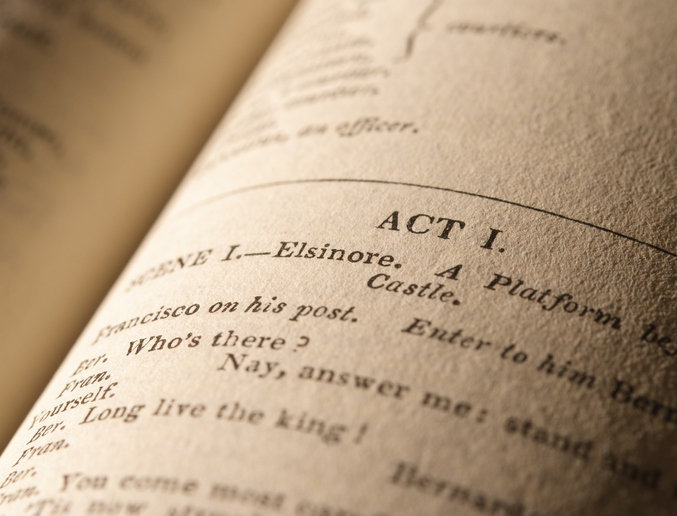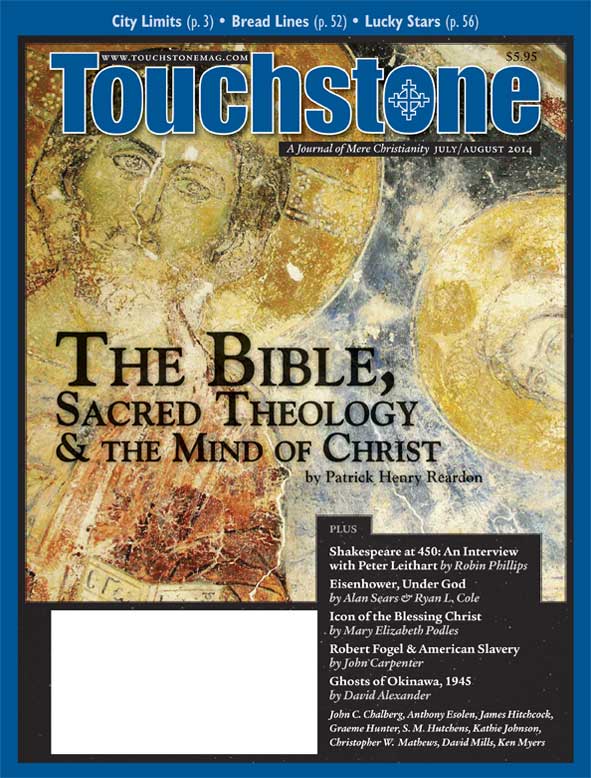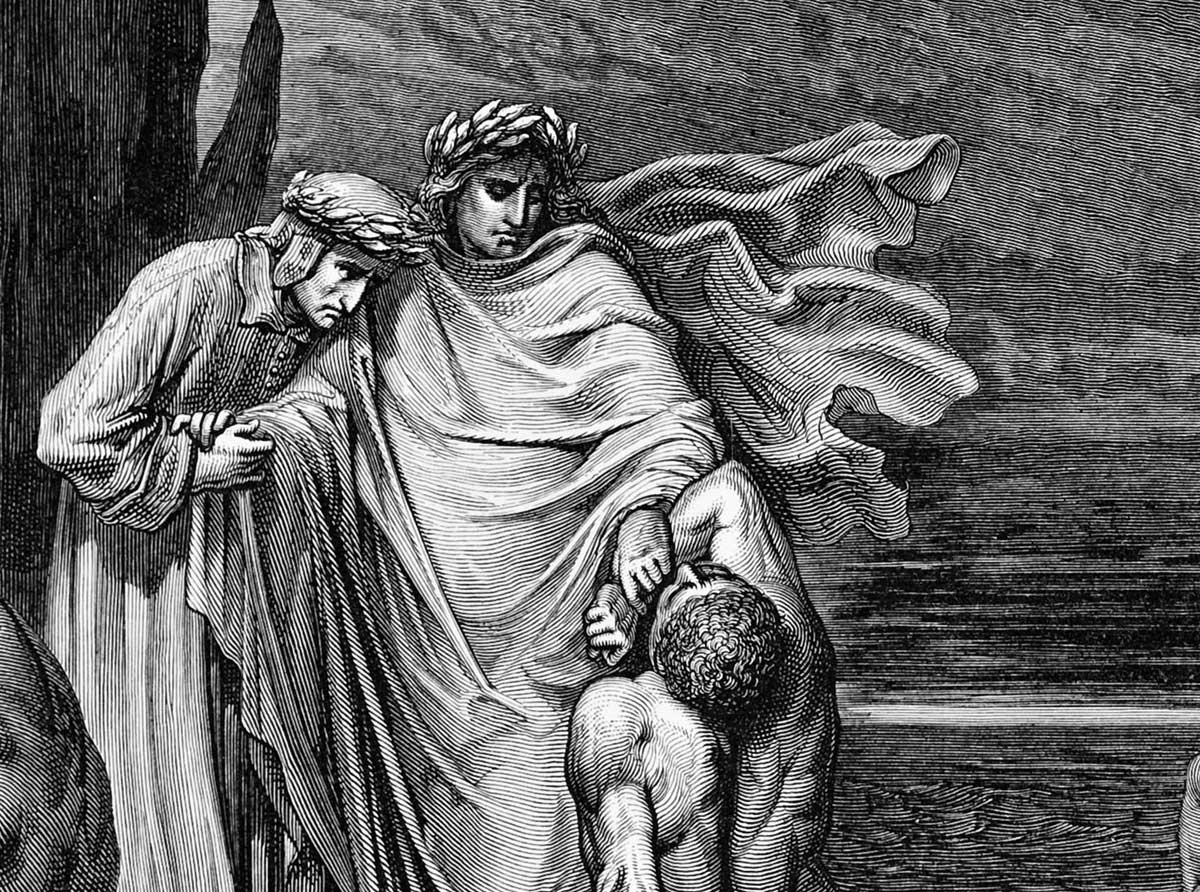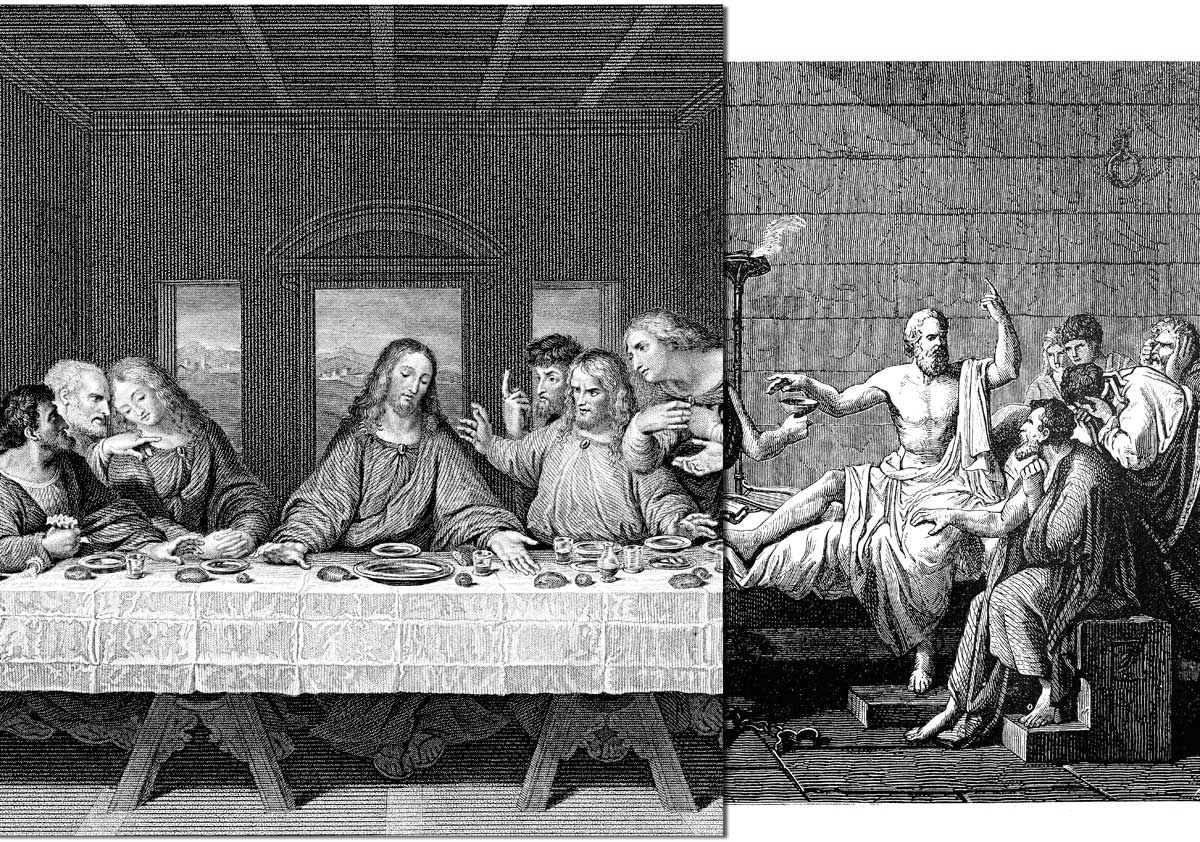Interview
The Art & Craft
of Shakespeare
An Interview with Peter Leithart
by Robin Phillips
Over the years Peter Leithart and I have enjoyed discussing various things, from closed communion to postmodern literary theory. With this year being the 450th anniversary of Shakespeare's birth, our discussions turned naturally to the work and legacy of the Elizabethan bard. The interview below represents the majority of our discussions.
• • •
Robin Phillips (RP): Many people perceive Shakespeare as a relic of a bygone age. After all, he lived in a time before there were smartphones, internet, even TV. Is Shakespeare even relevant for the type of society we now inhabit?
Peter Leithart (PL): The most obvious riposte comes from the performance history of Shakespeare's plays. They've been adapted for all sorts of situations. Just in the last few years we've seen film adaptations that prove the point: Ian McKellen plays Richard III in pseudo-Nazi uniform; Julie Taymor's Titus Andronicus mixes ancient Roman and Fascist themes; and judging from the weapons and uniforms, Ralph Fiennes's Coriolanus might be fighting in Afghanistan or Kosovo. You can transfer Romeo and Juliet to L.A., turn the warring families into gangs and the swords into guns, and the star-crossed lovers seem like kids down the street.
I think that flexibility is partly due to the fact that Shakespeare wrote plays, and wrote them with few scene-setting stage directions. Austen's world is clearly not ours, nor is Dickens's; that leaps off the page. With Shakespeare, we have drama without much in the way of scenery, and even though the characters talk funny, they are recognizable human characters.
And of course there's the old truism that Shakespeare's plays deal with the perennial dramas of human life—war, love, betrayal, ambition, gossip, trickery, death, hope, reunion, mystery and magic. It's a truism, but it's also true.
RP: We know very little about the historical Shakespeare, which means that his plays and poems are really all we have to go on when trying to discern his vision of the world. But do his works even convey a certain vision of the world?
PL: I believe they do. He was (I believe) a Christian playwright in a Christian society, and judging from the plays, it seems he held to the Christian convictions that were widely shared in his world. I don't think we can talk about Shakespeare's "philosophy." I imagine it wasn't as self-conscious as that. Still, though I don't want to reduce him to a pundit, I'm convinced that he self-consciously raised and dramatized certain live theological and political issues. A number of recent studies have emphasized how the Elizabethan stage functioned as a kind of alternative pulpit.

He was also like Cassius, "a keen observer of men." He understood power, had a sense of the complexities of motivation and psychology, grasped and enjoyed the erotic repartee between men and women. One critic has explained the mystery of Hamlet's character by suggesting that Shakespeare meant to make him unfathomable: "What a piece of work is man!" indeed. I think this is what accounts for the centuries of attention to Shakespeare as a "thinker." He was a poet and playwright, a craftsman who wanted to entertain and instruct. But he had such a sure sense of human experience that his work inevitably raises philosophical and theological questions that he may never have thought of in philosophical terms.
RP: What would be an example of some of these questions?
PL: Well, classic questions about appearance and reality, about "being" and "seeming." That comes up in Hamlet: these are the actions a man might play, Hamlet says of his inky cloak and all the accoutrements of woe, but there is something in him that passes show, a deep sorrow that's not expressible in outward signs. It comes up in the comedies, with all the disguises and counterfeits and such. "All that glisters is not gold," says one of the messages in a casket in The Merchant of Venice, and that's a theme for that play and for many others. Because Shakespeare is writing plays and not philosophical treatises, though, this philosophical issue has an existential punch to it. We realize how much our lives are about trying to discern the difference between being and seeming.
While I'm on that, I should add that Shakespeare also has a profound sense of what we could call the reality of symbols. He makes the distinction (I think, in good Protestant fashion) between reality and symbol, but then also realizes that symbols make reality. That comes out especially in the English political plays. One of my favorite speeches in Shakespeare is Henry V's meditation on kingship on the night before the battle of Agincourt. Henry reflects on "ceremony," the signs and rituals that made him king. He knows that he is king only because of these rituals; ceremony is the clothing that distinguishes him from everyone else. But he also knows that the clothing doesn't give him the power to make his kingdom prosper. Ceremony is everything and nothing. That's been a more fruitful insight for my understanding of sacraments than most treatises in theology.
Intersecting all this is Shakespeare's exploration of what we now think of as the problem of personal identity—what makes me who I am. Being a playwright, Shakespeare thinks of social life in terms of roles being played. All the world's a stage. But that doesn't make it unreal. The reality of social and political life is that people fill roles, sometimes roles that others impose on them, sometimes roles that they assume, sometimes roles that are in tension with their inner desires and purposes.
I could go on and on. Shakespeare's plays provide lots of fodder for exploring issues surrounding love and friendship, relations between the sexes, masculinity, festivity and seriousness, war, political intrigue. As I say, on and on.
RP: Shakespeare's comedies are often thought of as lighter and less serious than the tragedies. Is this a correct perception?
PL: I think that's an unfortunate bias. Why should a play with a happy ending be less serious than one in which everyone ends up dead? Why should resurrection and marriage be less profound than death? I've found in my study and teaching of Shakespeare over the years that the comedies are as psychologically, philosophically, and theologically rich as the tragedies—or more so.
RP: What are some of your favorites among the comedies?
PL: I like The Merchant of Venice for its Pauline resolution to the conflict between justice and mercy; Much Ado About Nothing mainly for the characters of Benedict and Beatrice. I've never quite gotten A Midsummer Night's Dream, though I think that's my flaw and not the play's. Twelfth Night is hard to watch in places, but the reunion scene between Viola and Sebastian is one of the most moving moments in Shakespeare.
RP: What is the best way to experience Shakespeare? Reading the plays privately? Watching them? Reading them first and then watching them?
PL: I always recommend that students both watch and read. Watching the plays can be a helpful start, a way of getting a sense of the whole. But you can't get the details of the poetry, characters, or plot from watching alone. It's all too intricate. You've got to read, too. Though Shakespeare wrote for the stage, he was also a poet, and I suspect that he wanted to have readers as well as watchers.
RP: When I talk to people about Shakespeare, one of the things I hear is that Shakespeare is a subject you study in school, but then leave behind when you're grown. How can we instil in our kids a love of Shakespeare, so that his works aren't perceived as just another subject?
PL: I'm sure that things are different today, but when I first studied Shakespeare in high school, we read and never saw the plays. Fortunately, I had a superb high-school English teacher, and so I learned to love the plays anyway. But the plays were made to be seen as well as read, and it makes a huge difference if students can see the plays enacted. There are excellent film versions available these days, many of which look like movies instead of like filmed stage plays. I think that's a key, because seeing the plays enacted helps students get to know the characters and understand the plot. They don't have to grasp every line of dialog to get the point, but it will get them started.
I remember the first time I saw Kenneth Branagh's Henry V. In the charming courtship scene at the end of the play, Henry and his future queen are talking when the French kings enters. Henry turns suddenly and says, in a somewhat frightened voice, "Here comes your father." Suddenly, the two are teenagers stealing a few moments away from parental eyes. The line is funny, but I wouldn't have known it was funny by reading it. I had to see the scene in action.
RP: What were some events that were contemporaneous with Shakespeare?
PL: The Tudor dynasty was relatively new in Shakespeare's time, and he wrote the pre-history of that dynasty in the one of his history tetralogies. The Elizabethan settlement regarding religion and the conflicts between Catholic and Protestant, and between varieties of Protestant, which continued throughout his lifetime in one form or another, marked some of his plays. From what we can tell, Shakespeare was not a lover of Puritanism, and contributed something to the caricature of Puritans as overbearing killjoys (Malvolio is called a "Puritan" in Twelfth Night). He lived in an age of exploration, and The Tempest is often read today against the background of the early history of British imperialism.
RP: That relates to another question: Was Shakespeare a Protestant or a Catholic?
PL: There has been quite a bit of discussion over the past several years about Shakespeare's religious faith. Some have argued that he was, or might have been, a recusant Catholic. There is some intriguing indirect evidence for that, not least the fairly regular references to Catholic practices. But overall the plays themselves seem to me to display a generic Protestant outlook. A number of recent studies of the Roman plays have pointed to analogies between Shakespeare's depictions of ancient Rome and Protestant polemics against the Roman church. As I mentioned before, The Merchant of Venice presents a very Pauline-Reformational position on justice and mercy, law and grace, and it's not the only play that does that.
RP: The lack of historical data about Shakespeare has created space for wild speculations about his sexuality. Would you care to comment on that?
PL: You can find plenty of internet articles claiming that Shakespeare was gay or bi-sexual, all based on the sonnets. There are some mystifying turns of phrase in the sonnets, but I think that this has to be seen in context. You can find a lot of medieval expressions of male affection that are so intimate and passionate that it makes our Victorian skins crawl—see some of the poems in Stephen Jaeger's Ennobling Love. In those monastic letters, the "gay" language doesn't imply a sexual relation; it was a standard way of expressing male friendship. If we take that context into consideration, Shakespeare's poems don't seem so unusual.
RP: We live in an era that tends to be very utilitarian in its approach to learning. Does this utilitarian type of mentality block our ears to the grandeur of Shakespeare? And does Shakespeare himself challenge this purely functional way of operating?
PL: Of course, a purely utilitarian mindset is in opposition to the appreciation of art in general, not merely of Shakespeare. If you're looking for measurable "outputs," then the arts aren't going to be of much interest.
But I think the issue is a more fundamental one. My inclination is to reject the opposition between function/utility and art. I reject the notion that art belongs to this ethereal realm beyond everyday life and need. Art is craftsmanship, and so one can be artistic in all sorts of everyday activities, not merely when pursuing the "fine arts."
I suspect that Shakespeare intended his plays to be "useful" and even "edifying." Poets had always wanted to write things that were "useful." Shakespeare's contemporaries certainly did. Spenser intended the Faerie Queene to form the reader into a gentleman; he wanted his poem to nurture his readers in its virtues.
RP: I'm curious if you have any thoughts about where the false dichotomy between art-as-craft and art-as-beyond-everyday-life came from. In Gene Veith's book State of the Arts, he blames the Enlightenment for this false dualism.
PL: It's always easy to blame the Enlightenment for all our ills, and I expect there's something to that. There's definitely a move to make human construction secular in the early modern period, the early Enlightenment. But I think the roots are pretty deep, all the way back to the Greek distinction between mere technical competence and the arts, or in Aristotelian terms, between poesis and praxis, making and practice. But the dualism certainly isn't there in the Middle Ages. Ars takes on wide connotations and applies to all sorts of human making. For some theologians, God himself is an artist—the Son being the eternal ars of the Father.
RP: Getting back to Shakespeare, some of his characters are among the most memorable in all literature. Tell us about two or three of your favorites.
PL: I'm skeptical about the question, frankly. Character-centered analysis of Shakespeare seems to come into being fairly late, in post-Coleridgean criticism. Of course, there are memorable, vibrant characters in the plays. But I'm not sure that this should be as much the center of attention as it has been.
But I'll put my skepticism aside and sort of answer the question—sort of, because these aren't my "favorite" but some of the more "fascinating." Shakespeare's characters fascinate because they are opaque. That's partly because of the genre; we don't get an omniscient narrator telling us what to think about the characters, as novelists always do, even if they do it subtly. You just have the words and actions to go on. That's what we have to go on in real life, and in real life we are often confused about what people are thinking and doing. It would be nice if the omniscient narrator intervened more often to give us some hints. Real people are opaque, and Shakespeare's characters seem real because they have the same mysterious depths. (Not all of them are equally mysterious of course; we know what Macbeth is up to.)
Many of the tragic heroes have this kind of depth. What is Hamlet thinking? Is he truly mad, or is it a disposition he's put on? What drives Lear into insanity? Or Cordelia for that matter—she tells us she can't heave her heart into her mouth, but c'mon girl, you can do better than that. I don't know how many times I've cited Coleridge's evaluation of Iago's complex motives—the "motive-seeking of motiveless malignancy." I think we all have met people who engage in the same bewildering motive-seeking. Of course, the comic characters are fun to watch. Bottom lets a ham really ham it up.
It's a truism, but it's true: Shakespeare was great at creating women characters. As I think about it, I think my "favorite" Shakespeare characters are all women, mostly from the comedies—Beatrice, Portia, Kate the shrew, Viola. Of course, for most of those, I have a particular actress in mind, so it's hard to know how to sort out my affection for the character from my admiration for the actress.
RP: Do you have any favorites among the historical plays?
PL: I have probably learned the most from the Roman plays. Though Shakespeare takes liberties with historical facts at times, he had a real sense of Roman character and culture. (Rome was far more important to Elizabethans than Greece; the cult of the Greeks came much later.) And I think that Shakespeare depicted Roman values from an essentially Christian angle that exposed the flaws of Roman civilization. Coriolanus, for instance, dramatizes the tragic devotion of a warrior to his mother-city.
I also find a lot to muse about in the English histories. Shakespeare was living at the transition point between medieval and modern political life, and he shows a deep awareness that something very profound is shifting. The sequence from Richard II through the two parts of Henry IV to Henry V and on to Richard III depicts a transition from medieval ceremonial and sacramental kingship to modern Machiavellian politics. It seems to me that Shakespeare found the change disquieting. "Machiavel" is an insult in Shakespeare. The English plays also probe the inherent connections between politics and the theater in profound ways. All the political world's a stage.
RP: It can sometimes be tempting for Christian educators to look at literary works as little more than fodder for worldview analysis, thus neglecting the dimensions that make those works great in the first place. In the case of Shakespeare, though he has much to teach us about human nature that coheres with the Christian worldview, his works are memorable mainly because he was such a great storyteller. Is this dimension of Shakespeare in danger of being overlooked by a "worldview-ism" approach to literary texts?
PL: Thanks for asking that one: you've hit on a pet peeve. I'm ready to delete "worldview" from Christian vocabulary. It's an especially clunky category for evaluating art. Drama and poetry can't be reduced to clever ways of communicating ideas, which is what happens in "worldview" analysis.
To get the worldview, you extract ideas about man, society, God, and nature from the plays and organize them into a system; you ignore the poetry and the plot and everything that makes the play a play or the poem a poem. You come to the plays with a preconceived framework that makes it impossible to learn anything from them, much less enjoy them. You produce students who are glib know-it-alls, who don't need to read the plays carefully because they already know what they think.
C. S. Lewis said that the first moment of any genuine literary criticism is a moment of submission to the work. Worldview analysis never submits; it always tries to dominate the work. As you can see, you've struck a nerve. This brings out the curmudgeon in me.
Rather than evaluating Shakespeare (or other poetry, drama, or fiction) with worldview categories, teachers should be teaching students to read. Memorize Lewis's An Experiment in Criticism before teaching another lit class. In short, Harrumph!
RP: Returning to Shakespeare, did he invent a new form of tragedy?
PL: I'm not sure Shakespeare invented a new form of tragedy, but his tragedies certainly don't work like ancient tragedies. We often import moral categories onto Sophocles and Aeschylus that don't fit their outlook on things. Oedipus doesn't get punished for a moral fault; he makes a tragic error, a tragic blunder. It's not that the gods are punishing him for incest. He just stumbled into disaster.
Shakespeare's tragedies are often much more straightforwardly moralistic, at least by our standards. Tragic characters make moral mistakes, transgress moral boundaries, and pay the consequences. Macbeth wades into blood voluntarily, and soon he's in so deep that he might as well keep swimming; Othello is manipulated, but his jealous suspicion is a moral fault that ends with him killing the one he loves. King Lear, I think, dramatizes a breach of order; Lear "untunes" the main string that keeps his kingdom in harmony—his own kingship—and everything falls apart. Hamlet is the most challenging of the great tragedies to fit into any of these categories. There, things do seem to spin out of control. He errs, especially in killing Polonius, but his tragedy is not nearly so straightforwardly ethical.
RP: In your writings about Shakespeare, you uncover many wonderful themes and make lots of interesting connections. However, I sometimes wonder if your mind is overactive in seeing significances that perhaps Shakespeare never intended. If so, would this even be a problem? Does literary criticism need to be constrained by authorial intent?
PL: That's a huge question, and I can talk around it rather than answer it definitively. My more expansive thoughts on all this are found in my book on hermeneutics, Deep Exegesis.
Authorial intent is certainly a factor, but I don't think that it alone is the decisive factor in determining the meaning of a text. If it were, we'd be in Humpty-Dumpty land where "glory" means "a nice, knock-down argument" just because we intend it to. John Frame points out that if someone intends to say "the noetic effects of sin" and instead writes "the poetic effects of sin," his intention doesn't change the meaning of his erroneous phrase. Language has a public meaning, and the intention of the author doesn't simply trump that. I know as an author that I often write things that imply conclusions that didn't occur to me—readers make connections that I didn't make, but they are there in the text or at least are "good and necessary deductions."
We want, of course, to know as much as we can about an author's time, his own personal circumstances, and so on. Those place constraints on meaning. "Grass" in Elizabethan England will not connote "marijuana." But if we lack that information, it doesn't make the text meaningless. There is still meaning in anonymous texts, and meaning in Shakespeare's plays, even if we don't know much about his life.
It's a truism that texts are understood in context. But as Jacques Derrida and other postmodern theorists have pointed out, the context keeps changing and growing. At one time, Shakespeare could only be understood in the context of Elizabethan England. But his plays were read again in the seventeenth century, and the nineteenth, and the twentieth, and so on. There is a fixity to the words on the page, but those words take on new colorations in the light of later events.
RP: Do you have any thoughts on the authorship debate?
PL: In some Christian circles, the Shakespeare authorship question has gained some traction—the question of whether William Shakespeare the actor and director is responsible for his plays. Some have said that he lacked the education and social background to produce the plays that we have. I think that's a dead end. Shakespeare's authorship is established in all the ways that literary scholars can use to establish authorship. To think someone else wrote the plays under his name, you have to believe in a vast conspiracy of silence on the part of everyone connected with the theater, and every poet. Ben Jonson has to be part of the conspiracy. Who knows, maybe Elizabeth herself (as in the silly film, Anonymous).
What intrigues me about the debate is less the historical question of Shakespeare's authorship and more the assumptions about authorship that the question betrays. No one questioned Shakespeare's authorship of the plays and sonnets until the Romantic era, which gave birth to a new conception of the artist and the poet. Shakespeare doesn't fit the post-Romantic paradigm. He's too bourgeois to be a poet, too concerned about his properties back in Stratford. I think we're back to the question of art and craft. Shakespeare is still working in the context of craft—he knows how to use words, and he knows how to dramatize stories, and he wants to make a good living doing it, good enough to become a burgher in his hometown. There are some very intriguing questions about art that come up in this discussion—plus some very eccentric people and weird theories.
My complaint about the whole discussion is what it does to the way people read the plays. Instead of paying attention to them as plays, people look for clues to Shakespeare's secret identity, or for allegories of infighting among Elizabeth's courtiers. Shakespeare's plays did have some contemporary relevance, but not in that way.
RP: As a literary critic, you've published essays about Shakespeare's plays. Can you direct Touchstone readers to where they can find some of your further thoughts about Shakespeare?
PL: My main work on Shakespeare was a book, Brightest Heaven of Invention, which discussed six plays in some detail. I've written on other plays in chapters of other books—on Lear in Deep Comedy, on Coriolanus in my recent book, Gratitude.
RP: Thank you very much, Dr. Leithart. To conclude this interview, do you have a quote or a key insight from Shakespeare that you'd like to share?
PL: To get the full effect, you have to have it in context, but I am always moved by the beautiful conclusion to Twelfth Night. Orsino says to Olivia, who has been in disguise as a pageboy through the whole play: "Here is my hand: you shall from this time be / Your master's mistress." I can't say whether Shakespeare had it in mind, but that sounds to me like a glimpse of history's final wedding. •
Peter J. Leithart is an ordained minister in the Presbyterian Church in America and the president of Trinity House Institute for Biblical, Liturgical & Cultural Studies in Birmingham, Alabama. His many books include Defending Constantine (InterVarsity), Between Babel and Beast (Cascade), and, most recently, Gratitude: An Intellectual History (Baylor University Press). His weblog can be found at www.leithart.com. He is a contributing editor of Touchstone.
Robin Phillips has a Master’s in Historical Theology from King’s College London and a Master’s in Library Science through the University of Oklahoma. He is the blog and media managing editor for the Fellowship of St. James and a regular contributor to Touchstone and Salvo. He has worked as a ghost-writer, in addition to writing for a variety of publications, including the Colson Center, World Magazine, and The Symbolic World. Phillips is the author of Gratitude in Life's Trenches (Ancient Faith, 2020), and Rediscovering the Goodness of Creation (Ancient Faith, 2023). He operates a blog at www.robinmarkphillips.com.
subscription options
Order
Print/Online Subscription

Get six issues (one year) of Touchstone PLUS full online access including pdf downloads for only $39.95. That's only $3.34 per month!
Order
Online Only
Subscription

Get a one-year full-access subscription to the Touchstone online archives for only $19.95. That's only $1.66 per month!
bulk subscriptions
Order Touchstone subscriptions in bulk and save $10 per sub! Each subscription includes 6 issues of Touchstone plus full online access to touchstonemag.com—including archives, videos, and pdf downloads of recent issues for only $29.95 each! Great for churches or study groups.
Transactions will be processed on a secure server.
more on Literature from the online archives
more from the online archives
calling all readers
Please Donate
"There are magazines worth reading but few worth saving . . . Touchstone is just such a magazine."
—Alice von Hildebrand
"Here we do not concede one square millimeter of territory to falsehood, folly, contemporary sentimentality, or fashion. We speak the truth, and let God be our judge. . . . Touchstone is the one committedly Christian conservative journal."
—Anthony Esolen, Touchstone senior editor














